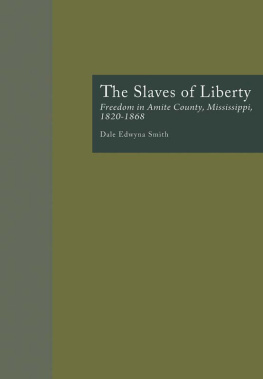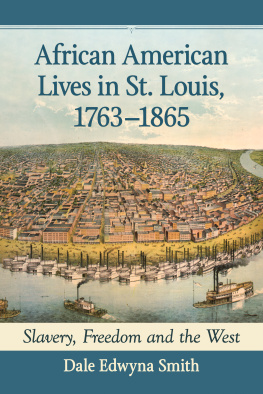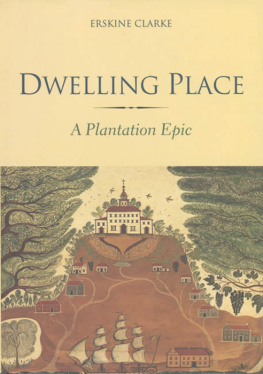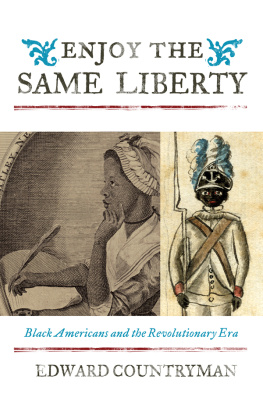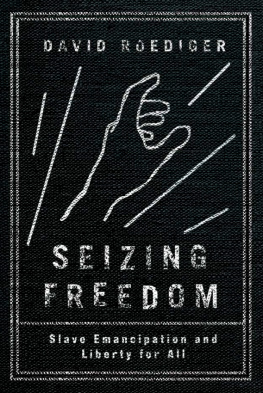THE SLAVES OF LIBERTY
CROSSCURRENTS IN AFRICAN AMERICAN HISTORY
VOLUME 2
GARLAND REFERENCE LIBRARY OF THE HUMANITIES
VOLUME 2081
CROSSCURRENTS IN AFRICAN AMERICAN HISTORY
GRAHAM RUSSELL HODGES AND MARGARET WASHINGTON, Series Editors
WRITINGS ON BLACK WOMEN OF THE DIASPORA
History, Language, and Identity
by Lean'tin L. Bracks
THE SLAVES OF LIBERTY
Freedom in Amite County, Mississippi, 1820-1868
by Dale Edwyna Smith
BLACK CONSERVATISM
Essays in Intellectual and Political History
edited by Peter Eisenstadt
THE SLAVES OF LIBERTY
FREEDOM IN AMITE COUNTY, MISSISSIPPI, 18201868
DALE EDWYNA SMITH
First published by Garland Publishing, Inc.
This edition published 2012 by Routledge:
| Routledge | Routledge |
| Taylor & Francis Group | Taylor & Francis Group |
| 711 Third Avenue | 2 Park Square, Milton Park |
| New York, NY 10017 | Abingdon, Oxon OX14 4RN |
Copyright 1999 by Dale Edwyna Smith
All rights reserved
Library of Congress Cataloging-in-Publication Data
Smith, Dale Edwyna.
The slaves of liberty : freedom in Amite County, Mississippi, 18201868 / by Dale Edwyna Smith.
p. cm. (Garland reference library of the humanities ; v. 2081. Crosscurrents in African American history ; v. 2)
Includes bibliographical references and index.
ISBN 0-8153-3082-0 (alk. paper)
1. Afro-AmericansMississippiAmite CountyHistory19th century. 2. LibertyHistory19th century. 3. SlavesMississippiAmite CountyHistory19th century. 4. Free Afro-AmericansMississippi Amite CountyHistory19th century. 5. Amite County (Miss.)Race relations. I. Title. II. Series. III. Series: Garland reference library of the humanities ; v. 2081. IV. Series: Garland reference library of the humanities. Crosscurrents in African American history ; v. 2.
F347.A5S64 1999
976.22400496073DC21 98-17110
CIP
To
the memory of
my grandfather,
Ezra Enoch Harris (19081991),
who was born in Amite County, Mississippi,
and
for my grandmother, Alta Lewis Harris (Mudgie) (b. 1908),
who chose to walk with him
the long road from Liberty
Contents
In the past thirty years, scholars in the field of African American studies have produced some of the most compelling and original books in American letters. Research on black leadership, labor, community, resistance, and intellectual tradition has blossomed into a field of inquiry of paramount importance. There has been a steady increase in historical scholarship, with younger academics reaching out in new directions and using innovative methodologies such as race and gender analysis. In works on all eras of American history, from each region of the country and even abroad, scholars today carry on the vigorous pursuit of knowledge and analytic interpretation that has always characterized African American studies.
Crosscurrents in African American History is a new series that aspires to publish the best and most recent research in the field. Garland Publishing is proud to present distinguished books that offer contemporary interpretations of the black experience in the United States. The topics in the series have been carefully chosen to fulfill this mission and to advance our knowledge of this critical field. Now and in the future, Garland will publish volumes that create new paradigms in African American historical scholarship, while resting securely on the accomplishments of established work in black studies.
Graham Russell Hodges
Margaret Washington
During the years of research and writing, which went first into my dissertation and now into this book, a number of individuals provided invaluable support and encouragement.
Obviously, an experienced and skillful advisor is essential for guiding a dissertation manuscript through to completion and, thereafter, revising it in ways that are useful for presentation as a full-fledged book. My advisor, Stephan Thernstrom, was invaluable in this respect. His nomination of my dissertation for the 1993 Allan Nevins Prize showed, not only his belief and pride in my project, but also the final worth of the dissertation and of the necessity for turning it into a readable book. Catherine Clinton was my second reader as well as a consistent and determined Muse, who provided shelter against many of the storms that graduate student life is heir to. I also appreciate the interest and assistance of David Herbert Donald, who encouraged me from the earliest phase of this project. He made an attentive appraisal of the dissertation manuscript and offered comments for the revision stage, which I think were both practical and valuable. In addition, several historians have offered encouragement along the way, including Darlene Clark Hine, Winthrop Jordan, Peter Kolchin, and Eric Arnesen.
Reese Nunnery, Chancery Clerk of Amite County, Mississippi, opened the gates to the record of antebellum life which now resides in the courthouse at Liberty, Mississippi, and Anethia Patterson Huff, his assistant, patiently and meticulously photocopied many hundreds of pages of that material for my use. In addition, Ernest Herndon, a Pike County journalist, wrote a number of newspaper articles to alert county residents to my ongoing research, thus attracting local interest and support.
Down the years, a number of individuals have labored to preserve and enrich me, body and soul. I remember them now with gratitude and love: Syvilla Tidwell, Laura Romano, Gloria Verbeck, Madeline Washington, Louise Casavant, and the late Roscoe Spicer.
My deepest gratitude is reserved to the prime builders of my character and aspirations, my family: my parents, Joyce Harris Smith and James Irving Smith, Jr., and my siblings. My Number One brother, Gym (Seitu James Irving Smith III) was my first friend and fan; my sister, Karen Smith Pitts, has been a constant and faithful friend, advisor and champion; my brother Guy Eric Smith has provided me with the joyous opportunity to experience what will likely be the closest I come to maternal feeling; and my youngest brothers Jabari Asim and Boyce Evan Smith allowed me to practice teaching skills, with both merited protests and exuberant expectation. My grandparents who have passed over, the late Mabel and James Irving Smith, Sr., enriched my life beyond measure or mentioning. And my ability to accomplish much of what I have accomplished is not only because of these individuals, but also and perhaps especially because of the acts of those whose names I cannot know, and whose stories echo in the pages of this study.
Antebellum Mississippi was the Cotton Kingdom; closer, perhaps, in actual fact, to that Old South of folklore and myth than any other Old South state. An almost tropical climate for much of the year produced a lush, natural vegetationa kind of paradise whose soil, serendipitously, also provided rich support for the cultivation of cotton across much of the state. Planters fleeing the worn-out soil of the Upper South had herded their slaves into the pristine lands of the then-new Southwest; and they had also sought refuge for themselves and their chattel from the sinister whisper of abolitionism, a chilling inspiration, in their minds, to black anarchy. The marriage of planter know-how from the older South, huge numbers of black slaves, and Mississippi soil was well consummated: by 1860, with the outbreak of civil war almost a given, Mississippi produced 25 percent of America's cotton crop. Also by 1860, however, the proportion of black slaves in those areas of heaviest cotton cultivation had reached a staggering 78 percent of the total population.

